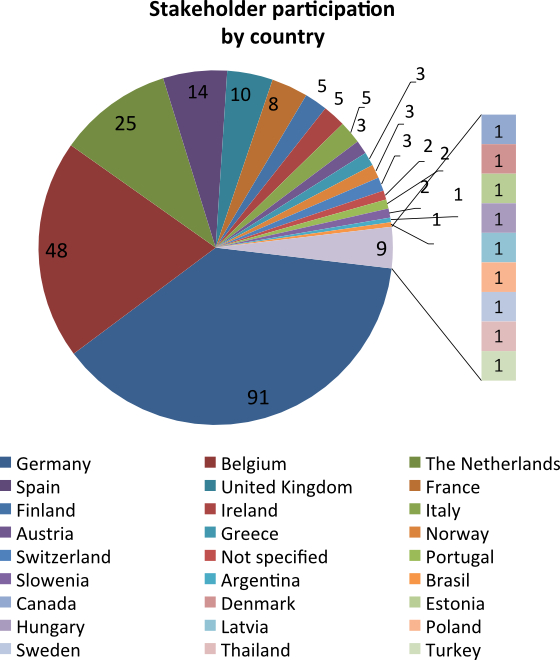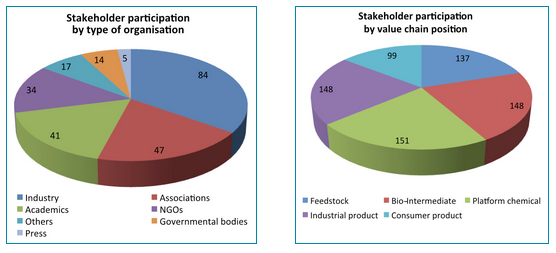Dear Reader,
Welcome to the 11th newsletter of the RoadToBio project. The project team is currently very busy – we are in the process of summarising all the information collected in a three-part Roadmap.
As the project is approaching the finishing line, we are contacting our stakeholders once more to get their views on our findings. We would like to extend a big thank you for your input so far, which has been incredibly valuable for our development of the Roadmap..
We hope you enjoy reading this newsletter.
Lea König
DECHEMA e.V.
On behalf of the RoadToBio consortium
Please consider – if not done already – to subscribe to the RoadToBio newsletter.
Stakeholders role in Roadmap Depelopment
Successful development of the RoadToBio Roadmap requires the collaboration of experts from the chemical industry, NGOs, governmental bodies, academia as well as the finance sector and brand owners.
The hurdles and potential issues regarding the increase of the bio-based share of chemical products cannot be resolved within the chemical industry alone. Therefore, governments, administrative bodies and NGOs need to work together with the chemical industry, as well as other industries along the value chain, to resolve these issues and develop joint strategic concepts for the short term.
Throughout this process, a dialogue between institutions should be established and maintained so that any issues that might occur in the development of a bio-based chemical industry can be readily resolved.
Various stakeholder groups are already involved in the development of the roadmap, through different engagement formats including workshops, interviews, webinars or 1-to-1 discussions.
The collaboration in RoadToBio has co-benefits for the involved stakeholders
In addition to the prospect of co-creating and determining the Roadmap content, cooperation with the RoadToBio team offers unique opportunities.
The Roadmap has potential to reach wide audiences with high impact. It will include different opinions of producers and consumers through an unbiased, credible voice. The challenges faced by individual institutions can be overcome through collaboration, for which this Roadmap aims to outline and address to the appropriate groups of stakeholders.
The target stakeholder groups range from raw material production along the process chain to the consumer product. The roadmap will encourage groups to participate in collaborative workshops and webinars that encourage growth and/or reinforcement of professional networks, and new business contacts and prospects to be made.
Successful development of the RoadToBio Roadmap requires the collaboration of experts from the chemical industry, NGOs, governmental bodies, academia as well as the finance sector and brand owners.
The hurdles and potential issues regarding the increase of the bio-based share of chemical products cannot be resolved within the chemical industry alone. Therefore, governments, administrative bodies and NGOs need to work together with the chemical industry, as well as other industries along the value chain, to resolve these issues and develop joint strategic concepts for the short term.
Throughout this process, a dialogue between institutions should be established and maintained so that any issues that might occur in the development of a bio-based chemical industry can be readily resolved.
Various stakeholder groups are already involved in the development of the roadmap, through different engagement formats including workshops, interviews, webinars or 1-to-1 discussions.
Over 200 stakeholders have been involved in the Roadmap development to date.
In order to shed light on the Roadmap development from as many perspectives as possible, various groups of stakeholders from many European countries and a variety of industries have been involved. These are categorised in a total of 7 groups, as follows:
- Chemical industry
(from feedstock providers to consumer product producers as well as brand owners) - Experts from the finance sector
- Academia
- Associations
- NGOs
- Governmental bodies
- Broader public
Members of the stakeholder network come from a total of 23 countries, 39% from Germany, 17% from Belgium (primarily European associations) and 11% from the Netherlands.

40% of the network members are based in industry, 24% in associations and 14% in academia. The smallest group with 6% represents governmental bodies. However, all relevant value chain positions are represented within the stakeholder groups in more or less equal shares.

To reach the target share of 25% bio-based chemicals in the organic chemical industry, it is of utmost importance to include stakeholders of the entire value chain from feedstock, bio-intermediate, platform chemicals, to the final consumer product. For statistical purposes, many of the stakeholders are assigned to several production steps, since their portfolio often covers a wider part of the value chain.
Stakeholder groups are specifically involved for different topics
The involvement of the stakeholder groups took place through various channels, to ensure a continuous information flow to relevant stakeholders, and to maintain their interest and to expand the network.
In two workshops, two webinars and 30+ individual interviews, expert stakeholders from various fields were as asked for their opinions on several topics, for example, what criteria are important to them to rank business cases, or what they think the public perception of bio-based products is. A selection of their statements will be included in the final Roadmap. A survey was conducted on key barriers and hurdles perceived by the industry that could make market entry more difficult or prevent markets from expanding.
In addition, the consortium presented the RoadToBio project at a dozen or so events and conferences to discuss the main topics of the Roadmap. Most recently,the scope and approach of the Roadmap was sent to selected stakeholders from the Chemical Industry as well as different associations to seek feedback on the content now in the early stages of the development of the final documents.
What you can expect from the next newsletter
In our next newsletter, we will talk about the next deliverable within the RoadToBio project, which is called “Ways to overcome regulatory and acceptance hurdles”. The report builds upon the previously collected knowledge about regulatory and societal barriers as well as public perception, all in regards to the bio-based economy and bio-based products.
In the deliverable, we have developed a set of key messages and recommendations specifically for the chemical industry in order to provide strategical approaches and ideas how the identified barriers and hurdles can be overcome. The final key messages and recommendations build on findings of other EU projects, went through an extensive stakeholder feedback process and will be part of the final Engagement Guide of the RoadToBio Roadmap.
Join the network
We would like to invite you to join us on the journey to a more bio-based chemical industry. The roadmap should contain clear, realistic goals. Your knowledge and experience is necessary to create a market relevant roadmap with a high impact. Therefore, we will conduct workshops and webinars to involve you as stakeholder.
Your opinion is of utmost importance to us. Through your participation, you get the opportunity to help shape the development process and to find your opinion later in the roadmap.
How?
Visit the project website: https://www.roadtobio.eu
Subscribe to the newsletter: https://www.roadtobio.eu/newsletter
Contact us at lea.koenig@dechema.de
Fill out the survey on key barriers and return it to: lea.koenig@dechema.de
Introduction of the RoadToBio Team
The consortium of this two-year project, which started in May 2017, consists of four members:
- DECHEMA Gesellschaft für Chemische Technik und Biotechnologie e.V.,
- BTG Biomass Technology Group BV,
- E4tech (UK) Ltd.,
- nova-Institut für politische und ökologische Innovation GmbH.
They bring in complementary expertise in relevant fields of the bioeconomy and chemical industry, covering in depth all aspects that need to be included in the roadmap.
This project has received funding from the Bio-Based Industries Joint Undertaking under the European Union’s Horizon 2020 research and innovation programme under grant agreement No. 745623.
Source
RoadToBio Newsletter October 2018, 2018-10.
Supplier
Bio-based Industries (BBI) Joint Undertaking
Biomass Technology Group BV (BTG)
DECHEMA Gesellschaft für Chemische Technik und Biotechnologie e.V.
E4tech
European Union
nova-Institut GmbH
Share
Renewable Carbon News – Daily Newsletter
Subscribe to our daily email newsletter – the world's leading newsletter on renewable materials and chemicals









